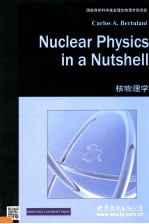图书介绍
核物理学 英文2025|PDF|Epub|mobi|kindle电子书版本百度云盘下载

- (美)波特兰尼(BertulaniC.A.)著 著
- 出版社: 北京;西安:世界图书出版公司
- ISBN:7510058240
- 出版时间:2013
- 标注页数:473页
- 文件大小:71MB
- 文件页数:485页
- 主题词:核物理学-英文
PDF下载
下载说明
核物理学 英文PDF格式电子书版下载
下载的文件为RAR压缩包。需要使用解压软件进行解压得到PDF格式图书。建议使用BT下载工具Free Download Manager进行下载,简称FDM(免费,没有广告,支持多平台)。本站资源全部打包为BT种子。所以需要使用专业的BT下载软件进行下载。如BitComet qBittorrent uTorrent等BT下载工具。迅雷目前由于本站不是热门资源。不推荐使用!后期资源热门了。安装了迅雷也可以迅雷进行下载!
(文件页数 要大于 标注页数,上中下等多册电子书除外)
注意:本站所有压缩包均有解压码: 点击下载压缩包解压工具
图书目录
Introduction1
0.1 What is Nuclear Physics?1
0.2 This Book3
1 Hadrons4
1.1 Nucleons4
1.2 Nuclear Forces5
1.3 Pions7
1.4 Antiparticles8
1.5 Inversion and Parity8
1.6 Isospin and Baryonic Number10
1.7 Isospin Invariance13
1.8 Magnetic Moment of the Nucleons14
1.9 Strangeness and Hypercharge15
1.10 Quantum Chromodynamics21
1.11 Exercises29
2 The Two-Nucleon System31
2.1 Introduction31
2.2 Electrostatic Multipoles32
2.3 Magnetic Moment with Spin-orbit Coupling34
2.4 Experimental Data for the Deuteron36
2.5 A Square-well Model for the Deuteron38
2.6 The Deuteron Wave function41
2.6.1 Angular momentum coupling41
2.6.2 Two particles of spin 1/242
2.6.3 Total wavefunction43
2.7 Particles in the Continuum:Scattering46
2.8 Partial Wave Expansion49
2.9 Low Energy Scattering53
2.10 Effective Range Theory59
2.11 Proton-Proton Scattering61
2.12 Neutron-Neutron Scattering64
2.13 High Energy Scattering65
2.14 Laboratory and Center of Mass Systems65
2.15 Exercises68
3 The Nucleon-Nucleon Interaction71
3.1 Introduction71
3.2 Phenomenological Potentials72
3.3 Local Potentials72
3.3.1 Nonlocal potential78
3.4 Meson Exchange Potentials80
3.4.1 Yukawa and Van der Waals potentials80
3.4.2 Field theory picture84
3.4.3 Short rangepart of the NN interaction86
3.4.4 Chiral symmetry87
3.4.5 Generalized boson exchange89
3.4.6 Beyond boson exchange91
3.5 Effective Field Theories94
3.6 Exercises96
4 General Properties of Nuclei98
4.1 Introduction98
4.2 Nuclear Radii98
4.3 Binding Energies101
4.4 Total Angular Momentum of the Nucleus104
4.5 Multipole Moments104
4.6 Magnetic Dipole Moment106
4.7 Electric Quadrupole Moment109
4.8 Excited States of Nuclei111
4.9 Nuclear Stability114
4.10 Exercises116
5 Nuclear Models119
5.1 Introduction119
5.2 The Liquid Drop Model119
5.3 The Fermi Gas Model124
5.4 The Shell Model128
5.5 Residual Interaction142
5.6 Nuclear Vibrations144
5.7 Nuclear Deformation149
5.8 The Nilsson Model150
5.9 The Rotational Model153
5.10 Microscopic Theories160
5.10.1 Hartree-Fock theory160
5.10.2 The Skyrme interaction162
5.10.3 Relativistic mean field theory164
5.11 Exercises166
6 Radioactivity170
6.1 Introduction170
6.2 Multiple Decays—Decay Chain171
6.3 Preparation of a Radioactive Sample173
6.4 Secular Equilibrium174
6.5 Natural Radioactive Series174
6.6 Radiation Units176
6.7 Radioactive Dating177
6.8 Properties of Unstable States—Level Width179
6.9 Transition Probability—Golden Rule181
6.10 Exercises183
7 Alpha-Decay185
7.1 Introduction185
7.2 Theory of α-Decay185
7.3 Angular Momentum and Parity in α-Decay191
7.4 Exercises194
8 Beta-Decay195
8.1 Introduction195
8.2 Energy Released in β-Decay196
8.3 Fermi Theory197
8.4 The Decay Constant—The Log ft Value202
8.5 Gamow-Teller Transitions204
8.6 Selection Rules206
8.7 Parity Nonconservation in β-Decay206
8.7.1 Double β-Decay211
8.8 Electron Capture213
8.9 Exercises215
9 Gamma-Decay218
9.1 Introduction218
9.2 Quantization of Electromagnetic Fields218
9.2.1 Fields and gauge invariance218
9.2.2 Normal modes220
9.2.3 Photons221
9.3 Interaction of Radiation with Matter224
9.3.1 Radiation probability227
9.3.2 Long wavelength approximation228
9.4 Quantum and Classical Transition Rates235
9.5 Selection Rules240
9.6 Estimate of the Disintegration Constants241
9.7 Isomeric States243
9.8 Internal Conversion244
9.9 Resonant Absorption—The M?ssbauer Effect249
9.10 Exercises255
10 Nuclear Reactions—Ⅰ258
10.1 Introduction258
10.2 Conservation Laws260
10.3 Kinematics of Nuclear Reactions261
10.4 Scattering and Reaction Cross Sections265
10.5 Resonances270
10.6 Compound Nucleus273
10.7 Mean Free Path of a Nucleon in Nuclei276
10.8 Empirical Optical Potential277
10.9 Compound Nucleus Formation282
10.10 Compound Nucleus Decay290
10.11 Exercises294
11 Nuclear Reactions—Ⅱ298
11.1 Direct Reactions298
11.1.1 Theory of direct reactions301
11.2 Validation of the Shell Model303
11.3 Photonuclear Reactions306
11.3.1 Cross sections307
11.3.2 Sum rules308
11.3.3 Giant resonances312
11.4 Coulomb Excitation315
11.5 Fission319
11.6 Mass Distribution of Fission Fragments321
11.7 Neutrons Emitted in Fission324
11.8 Cross Sections for Fission325
11.9 Energy Distribution in Fission327
11.10 Isomeric Fission328
11.11 Exercises331
12 Nuclear Astrophysics334
12.1 Introduction334
12.2 Astronomical Observations335
12.2.1 The Milky Way335
12.2.2 Dark matter336
12.2.3 Luminosity and Hubble's law337
12.3 The Big Bang338
12.4 Stellar Evolution341
12.4.1 Stars burn slowly341
12.4.2 Gamow peak and astrophysical S-factor342
12.5 The Sun347
12.5.1 Deuterium formation348
12.5.2 Deuterium burning350
12.5.3 3He burning351
12.5.4 Reactions involving 7Be352
12.6 The CNO Cycle354
12.6.1 Hot CNO and rp process355
12.7 Helium Burning357
12.8 Red Giants360
12.9 Advanced Burning Stages362
12.9.1 Carbon burning362
12.9.2 Neon burning364
12.9.3 Oxygen burning365
12.9.4 Silicon burning365
12.10 Synthesis of Heaviest Elements367
12.11 White Dwarfs and Neutron Stars368
12.12 Supernova Explosions370
12.13 Nuclear Reaction Models375
12.13.1 Microscopic models375
12.13.2 Potential and DWBA models376
12.13.3 Parameter fit377
12.13.4 Statistical models377
12.14 Exercises379
13 Rare Nuclear Isotopes385
13.1 Introduction385
13.2 Light Exotic Nuclei388
13.2.1 Halo nuclei390
13.2.2 Borromean nuclei393
13.3 Superheavy Elements395
13.4 Exercises400
Appendix A Angular Momentum401
A.1 Orbital Momentum401
A.2 Spherical Functions402
A.3 Generation of Rotations402
A.4 Orbital Rotations403
A.5 Spin404
A.6 Ladder Operators406
A.7 Angular Momentum Multiplets409
A.8 Multiplets as Irreducible Representations412
A.9 SU(2)Group and Spin 1/2413
A.10 Properties of Spherical Harmonics414
A.10.1 Explicit derivation414
A.10.2 Legendre polynomials415
A.10.3 Completeness416
A.10.4 Sphericalfunctions as matrix elements of finite rotations417
A.10.5 Addition theorem417
Appendix B Angular Momentum Coupling419
B.1 Tensor Operators419
B.1.1 Transformation of operators419
B.1.2 Scalars and vectors420
B.1.3 Tensors of rank 2421
B.1.4 Introduction to selection rules422
B.2 Angular Momentum Coupling423
B.2.1 Two subsystems423
B.2.2 Decomposition of reducible representations424
B.2.3 Tensor operators and selection rules revisited426
B.2.4 Vector coupling of angular momenta427
B.2.5 Wigner-Eckart theorem428
B.2.6 Vector Model429
Appendix C Symmetries432
C.1 Time Reversal432
C.2 Spin Transformation and Kramer's Theorem433
C.3 Time-conjugate Orbits435
C.4 Two-component Neutrino and Fundamental Symmetries436
C.5 Charge Conjugation437
C.6 Electric Dipole Moment438
C.7 CPT-Invariance439
Appendix D Relativistic Quantum Mechanics440
D.1 Lagrangians440
D.1.1 Covariance441
D.2 Electromagnetic Field442
D.3 Relativistic Equations444
D.3.1 Particleat rest446
D.3.2 Covariant form:y matrices446
D.4 Probability and Current448
D.5 Wavefunction Transformation448
D.5.1 Bilinear Covariants450
D.5.2 Parity451
D.6 Plane Waves451
D.6.1 Summary of plane wave spinor properties453
D.6.2 Projection operators454
D.7 Plane Wave Expansion454
D.8 Electromagnetic Interaction455
D.9 Pauli Equation455
D.9.1 Spin-orbit and Darwin terms457
Appendix E Useful Constants and Conversion Factors459
E.1 Constants459
E.2 Masses460
E.3 Conversion Factors460
References461
Index469
热门推荐
- 3190382.html
- 1028630.html
- 3686287.html
- 1502734.html
- 405913.html
- 2655452.html
- 1472870.html
- 1875396.html
- 2351412.html
- 276232.html
- http://www.ickdjs.cc/book_2601474.html
- http://www.ickdjs.cc/book_1524663.html
- http://www.ickdjs.cc/book_2821036.html
- http://www.ickdjs.cc/book_2412406.html
- http://www.ickdjs.cc/book_3172924.html
- http://www.ickdjs.cc/book_1393706.html
- http://www.ickdjs.cc/book_1991786.html
- http://www.ickdjs.cc/book_695398.html
- http://www.ickdjs.cc/book_3353433.html
- http://www.ickdjs.cc/book_1757157.html